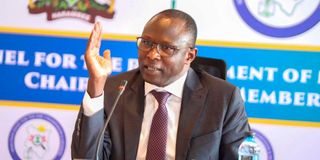New IEBC team sworn in at noon

IEBC chairperson Erastus Edung Ethekon.
Seven commissioners of the electoral body have been sworn into office this afternoon.
The Independent Electoral and Boundaries (IEBC) commissioners, led by chairperson Erastus Edung Ethekon were sworn into office by Chief Justice Martha Koome, a day after their appointments were cleared by a bench of three judges of the High Court.
They will serve for a term of six years.
The commissioners are Ann Njeri Nderitu, Moses Alutalala Mukhwana, Mary Karen Sorobit, Hassan Noor Hassan, Francis Odhiambo Aduol, and Fahima Araphat Abdallah.
President William Ruto gazetted the seven individuals a few hours after the High Court faulted him for confirming their appointments while there was a court order stopping the process.
The court, however, said the appointments did not violate the constitutional principles of public participation, consultation with political parties, and access to information.
The court further ruled that the recommendations contained in the Report of the National Dialogue Committee (NADCO) were not applicable to the issue of selection, nomination, and appointment of the Chairperson and the Commissioners of the IEBC.
The petition was filed by Roy Omondi and Boniface Mwangi, who challenged the process conducted by the IEBC selection panel as well as the selections made by President Ruto before transmitting the names to Parliament.
The two petitioners also question the qualifications, integrity, suitability, and merit of the nominees, as well as the composition of the list of seven commissioners on the grounds that it lacked regional diversity and the failure to include a person with disabilities.
Attorney General and Parliament defended the process, arguing that the petitioners had not produced any evidence to substantiate their claims and had misapplied the applicable laws, and had framed a Petition that offends critical legal doctrines such as separation of powers and exhaustion of other remedies.
While dismissing the petition, Justices Roselyn Aburili, John Chigiti and Bahati Mwamuye said there was no evidence of irregularity or proof of constitutional breach or bias.
The judges added that there was no evidence that the nominees were not eligible or there was no regional balance.


